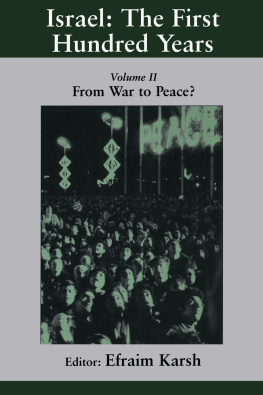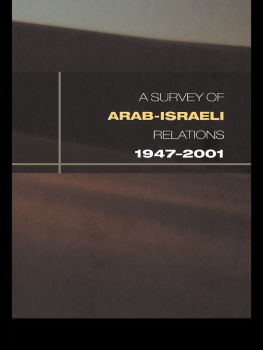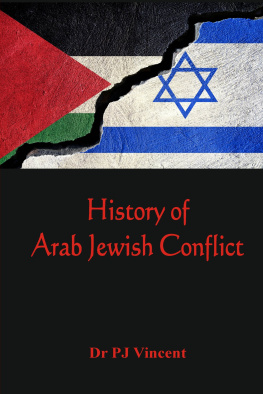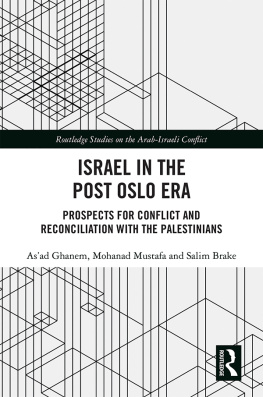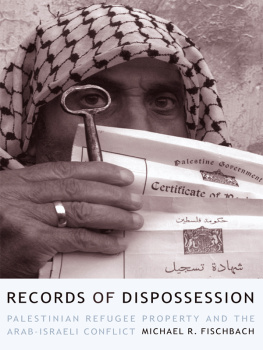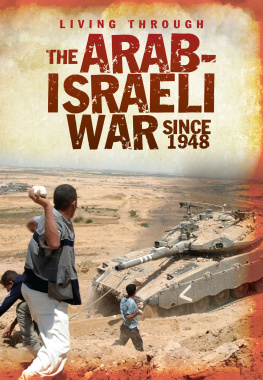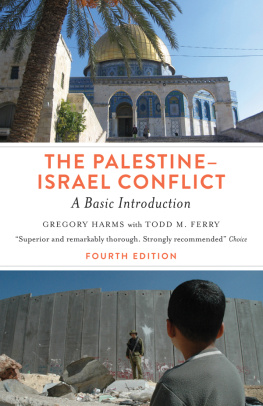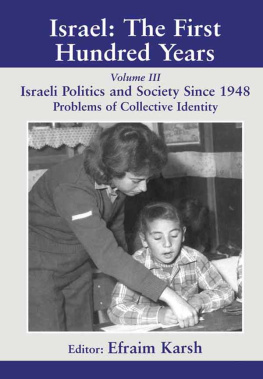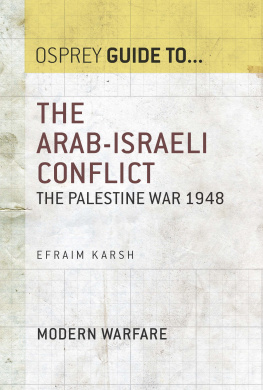ISRAEL: THE FIRST HUNDRED YEARS
Israeli History, Politics and Society
Series Editor: Efraim Karsh, King's College London
ISSN 1368-4795
Providing a multidisciplinary examination in all aspects, this series serves as a means of communication between the various communities interested in Israel: academics, policy-makers, practitioners, journalists and the informed public.
Other books in the series:
Peace in the Middle East: The Challenge for Israel
edited by Efraim Karsh
The Shaping of Israeli Identity: Myth, Memory and Trauma
edited by Robert Wistrich and David Ohana
Between War and Peace: Dilemmas of Israeli Security
edited by Efraim Karsh
U.S.Israeli Relations at the Crossroads
edited by Gabriel Sheffer
From Rabin to Netanyahu: Israel's Troubled Agenda
edited by Efraim Karsh
Israel at the Polls 1996
edited by Daniel J. Elazar and Shmuel Sandler
In Search of Identity: Jewish Aspects in Israeli Culture
edited by Dan Urian and Efraim Karsh
Israel: The Dynamics of Change and Continuity
edited by David Levi-Faur, Gabriel Sheffer and David Vogel
Revisiting the Yom Kippur War
edited by P.R. Kumaraswamy
Peacemaking in Israel after Rabin
edited by Sasson Sofer
Parties, Elections and Cleavages: Israel in Comparative and Theoretical Perspective
edited by Reuven Y. Hazan and Moshe Maor
Israel: The First Hundred Years
Volume II
From War to Peace?
Editor
Efraim Karsh
First published in 2000 by
FRANK CASS PUBLISHERS
This edition published 2013 by Routledge
2 Park Square, Milton Park, Abingdon, Oxon OX14 4RN
711 Third Avenue, New York, NY 10017
Routledge is an imprint of the Taylor & Francis Group, an informa business
Copyright 2000 Frank Cass & Co. Ltd
British Library Cataloguing in Publication Data
Israel: the first hundred years
Vol. 2: From war to peace? - (Israeli history, politics and society)
1. Jews - Palestine - History - 20th century
2. Palestine - History - 20th century
I.Karsh, Efraim
956.9'4'05
ISBN 0 7146 4962 7 (cloth)
ISBN 0 7146 8023 0 (paper)
ISSN 1368-4795
Library of Congress Cataloging-in-Publication Data
A catalog record for this book is available from the Library of Congress
This group of papers first appeared in a Special Double Issue of Israel Affairs 6/34 (Spring/Summer 2000), 'Israel: From War to Peace?' ISSN 1353-7121 published by Frank Cass.
All rights reserved. No part of thxis publication may be reproduced, stored in or introduced into a retrieval system or transmitted in any form or by any means, electronic, mechanical, photocopying, recording or otherwise, without the prior written permission of the publishers of this book.
Contents
| David Tal |
| Motti Golani |
| Mordechai Gazit |
| Menachem Klein |
| Shlomo Aronson |
| Uri Bar-Joseph |
| David Rodman |
| Edwin S. Cochran |
| Eliezer Tauber |
| Ilan G. Gewurz |
| Nadav Morag |
| Neill Lochery |
| Elisha Efrat |
| Efraim Inbar |
DAVID TAL
For quite some time the historiography of the 1948 Arab-Israeli war has been subjected to a vehement academic and public debate in Israel. The debate was triggered by a group of academics calling themselves the 'New Historians' who claimed to have uncovered new archival evidence relating to the creation of Israel and its first war with its Arab neighbours. Oddly enough, the actual state of research on the 1948 War lags far behind the debate on the subject, not least with regard to the initial stage of the war, namely the Jewish-Palestinian struggle preceding the Arab invasion of May 1948. There is no comprehensive study of that conflict and the literature on the subject can be divided into two schools of thought. Israeli historians tend to concentrate on the war's organizational aspects, depicting the period as a preparatory stage of the Jewish state's War of Independence. Yet they have hardly touched the political thinking underlying the strategic planning and military actions of the Jewish armed forces in the struggle with the Palestinians.
The other historiographical school of thought, articulated by Palestinians and writers sympathetic to their cause, depicts Jewish actions as part of a deliberate and vicious attempt to take over the country and disinherit its indigenous population. Commenting on Walid Khalidi's writing in this vein, the American historian William Roger Louis expects that 'further detailed research will probably substantiate rather than alter' such conclusions and interpretation.
What is glaringly missing from the latter narrative is the war itself. Nothing is said about the parties' war planning or their conduct and actions in the course of hostilities. The outcome of the Jewish-Palestinian strife is detached, according to this school of thought, from the historical process that produced it. Moreover, historians of both persuasions have downplayed, or ignored altogether, the Jewish-Palestinian war. Most importantly, they fail to explain how is it that the Palestine Arab community, which was twice the size of the Jewish community (about 1,200,000 Arabs compared to 600,000 Jews) and ostensibly enjoyed the support of the surrounding Arab states, still suffered such a devastating blow at the hands of the Jews.
This essay seeks to fill this lacuna and to shed new light on a conflict covered by layers of ideological polemic aimed at justifying one's own views and politics and negating contending approaches. By way of doing so, it will describe and analyse the sources, developments and turning points in the political and strategic thinking of both belligerents, and will offer an explanation for the Palestinian defeat.
More specifically, it will be shown that the Jewish acceptance of the United Nations Partition Resolution of 29 November 1947 was translated into the war strategy that was executed during the initial stages of the conflict. The Palestinians, for their part, determined to prevent such an eventuality, opted for a war for which they were unprepared and ill equipped. Riven by internal conflicts and in discord with the Arab governments, they were no match for the highly motivated, well-organized and unified Jews.
Jewish Preparations
Despite the violent nature of the Zionist-Palestinian conflict from its inception, the major battlefield for the Jews, at least until the second half of the 1940s, was the political arena. For a while, the British and international pledges of a 'National Home' for the Jews in Palestine, set forth in the Balfour Declaration and the League of Nations Mandatory charter, enabled the tiny Jewish community in Palestine (known as the Yishuv) to grow and flourish, despite the hostile attitude of the local Arab population. The Jews concentrated mainly on developing defensive capabilities against Arab harassment, co-operating as much as possible with the Mandatory government. Their aim was to claim the country through hard work and political activity. On the Jewish-Palestinian front, the Yishuv leadership had to cope with day-today security problems, mainly random raids and attacks by Palestinians against Jews. But the very existence of the Yishuv seemed secure, as long as British forces were in the country.

